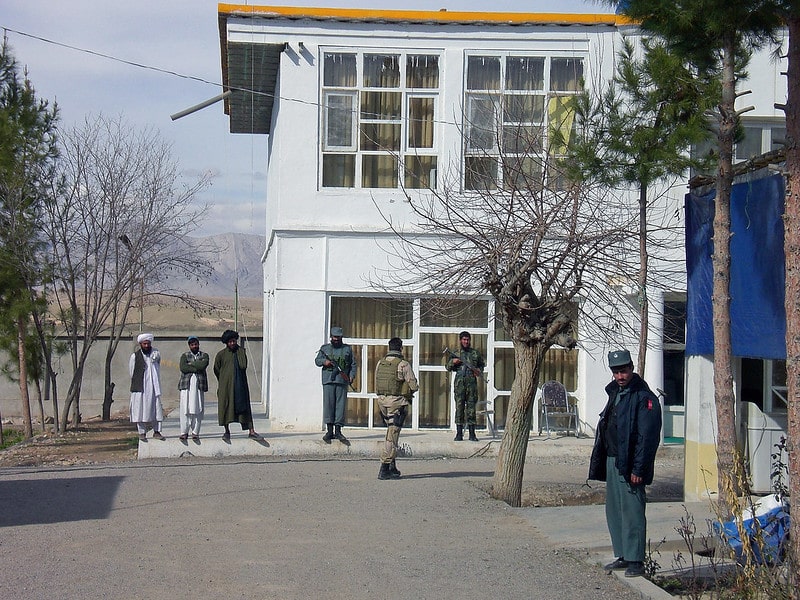Photo: Afghan women speak at the UN: "Give us a seat at the table." - Flickr
Today, the 8th of March, we celebrate International Women’s Day: a day that honours women’s contributions and achievements, highlights their right to gender equality, and sheds light on the challenges they face. As the world reflects on the progress achieved and the road ahead, we focus on Afghanistan—a nation grappling with a severe regression in women’s rights. Since the Taliban's resurgence in 2021, Afghan women have endured a relentless assault on their basic freedoms. They no longer have access to education after sixth grade, have been banned from going to parks and gyms, and are not allowed to work outside of health and education, sparking international concern and calls for action.
Despite initial global solidarity, media coverage and attention to the plight of Afghan women has decreased in recent months, even as their situation continues to deteriorate. A United Nations report released on February 16th, 2024, highlights escalating harassment, fear of arbitrary arrest, and the normalization of gender-based subordination within Afghan society. FMS spoke with women’s rights activist Husna Jalal to find out more about the current state of women’s rights in Afghanistan.
Increasing escalation of women's rights
In the aftermath of Kabul’s fall, the Taliban swiftly implemented a series of oppressive measures targeting women and girls. Of the 80 edicts that the Taliban have released in the first two years since they regained power, 54 specifically target the rights and liberties of women and girls. Jalal emphasized the gravity of the situation: “We are in 2024, and Afghanistan is the only country where education is banned for girls. Imagine being a girl in Afghanistan, what kind of life can you have?” “With each passing day, girls are losing their hopes,” she added.
Jalal also discussed the influence of the further deteriorating mental health of Afghan women: “There is a mental health crisis now, the situation is very bad.” “The forced marriage rate has increased, so have the suicide rates, and also the amount of internally displaced families,” she explains. Research conducted by the UN in 2023 resulted in the same conclusion, and found that Afghan women suffer from psychological problems including depression, loss of hope and motivation, anxiety, fear, aggression, increasingly isolationist behaviour, and thoughts of suicide as a result of the restrictions imposed on them by the Taliban regime.
Imposed democracy
Jalal additionally brings up the importance of the international community’s approach to addressing the crisis in Afghanistan. She highlights past intervention failures and stresses the importance of genuine Afghan representation in charting the nation’s future. External imposition of ideologies, she argues, has only hindered progress towards lasting solutions for democracy in Afghanistan.
Following the September 11 attacks in 2001, the United States, along with its allies, intervened militarily in Afghanistan and ousted the Taliban regime. Under pressure from the U.S. and other powers, an agreement was brokered by the United Nations and brought together various Afghan factions, including representatives of different ethnic groups and political backgrounds, to negotiate a political framework for the country’s future. This was the Bonn Agreement, signed in December 2001, and played a pivotal role in shaping Afghanistan’s post-Taliban political landscape. The United States maintained its military presence in Afghanistan following the invasion and aimed to democratize Afghanistan. They established a centralized presidential system, but the parliament lacked sufficient authority to effectively oversee the president. Under this system, the president was granted the power to appoint all provincial governors. It is further important to note that the Bush administration did not facilitate a transparent process for Afghans to democratically elect their first post-Taliban president. Instead, through the Bonn Agreement, they selected Hamid Karzai for the position and pressured Afghans to endorse this decision. “The West brought democracy to Afghanistan, the democracy was brought from outside, so that is why the people in Afghanistan never accepted it,” Jalal argues.
The collapse of the Afghan government and military in 2021, though shocking, was not unexpected. The problems started long before President Joe Biden decided to pull out troops. His predecessor, Donald Trump, made a deal with the Taliban in February 2020. This deal set a date for the U.S. to leave in 2021 and did not insist on a peace agreement among Afghans. Afghan soldiers and leaders lost hope, and talks to settle things politically were never a priority during the war. Instead, the focus was on short-term military goals. This approach ignored the fact that there were essentially two Afghanistans as the Taliban had control over most of the rural areas.
Hope for the future
Jalal remains resolute in her commitment to raising awareness through social media and other platforms. “I realized that I need to use my own voice, on social media, and on other platforms, to raise awareness about the situation of women in Afghanistan.” She works for organisations such as the Young Afghan Women's Movement, that offers online education and support. Despite mounting challenges, Husna says Afghan women refuse to surrender hope: “These women are not losing their hope, they are the future of Afghanistan.”
As the world marks International Women's Day, the plight of Afghan women demands urgent attention and action. The international community must pay attention to their calls, amplify their voices, and work tirelessly to ensure that Afghan women are not forgotten in the pursuit of a more just and equitable world.





